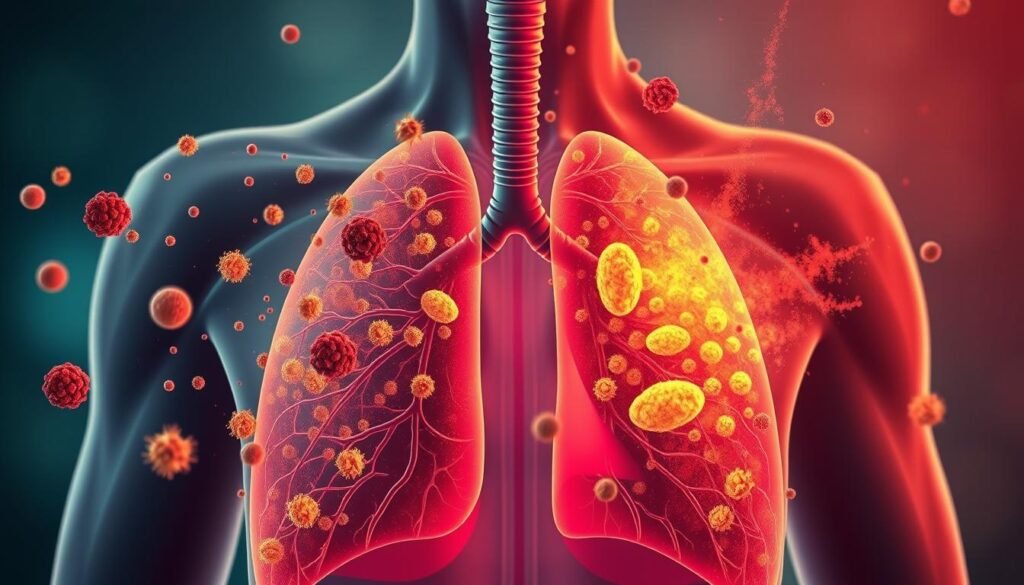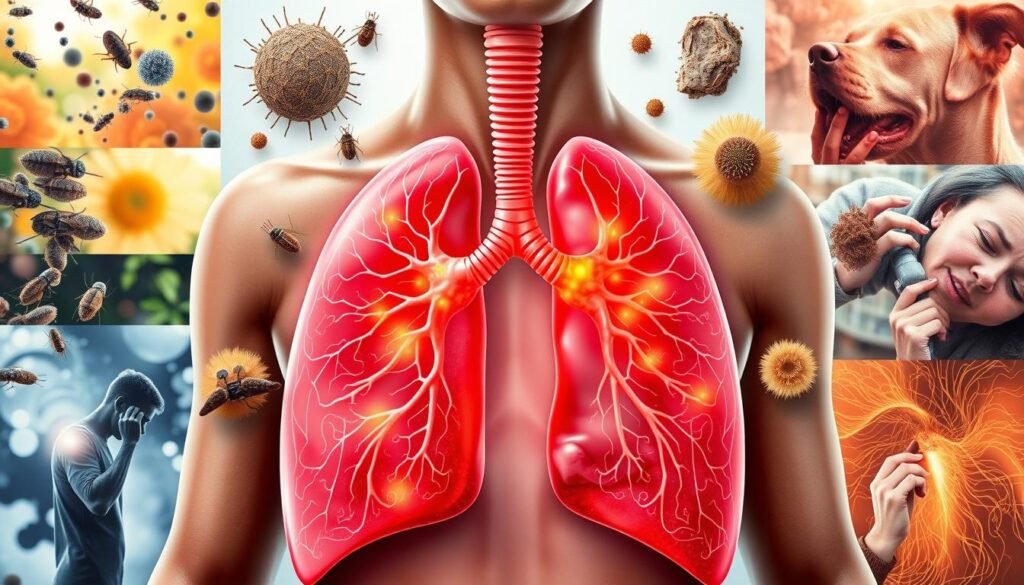About 26% of U.S. adults and 19% of kids have hay fever. This fact shows how chronic allergies greatly affect respiratory health. These allergies, especially from things like pollen, dust, and mold, can cause serious issues. Issues like chronic sinusitis and asthma come up. Also, if you don’t treat allergy symptoms like a stuffy nose, it can ruin your sleep and make life harder.
Dealing with chronic allergies means people might feel more tired, anxious, and have serious lung problems. If you have allergic asthma and keep having allergy attacks, it can hurt your lungs a lot. This is why it’s crucial to have good allergy management plans. They protect your health and comfort.
Key Takeaways
- Chronic allergies can lead to significant respiratory health issues, including chronic sinusitis and asthma.
- Repetitive allergy flare-ups may cause permanent lung damage if left untreated.
- Nasal congestion from allergies can disrupt sleep and negatively impact quality of life.
- Effective management strategies are vital for maintaining respiratory health and preventing complications.
- About 80% of childhood asthma cases are linked to allergens and allergic reactions.
Understanding Chronic Allergies
Chronic allergies affect people worldwide. The body’s immune response to allergens causes ongoing symptoms, creating challenges. Pollen, dust, mold, and animal dander are common triggers. These can cause an inflammation in the body. This leads to various allergy symptoms, from mild to severe.
Both genetics and the environment play roles in chronic allergies. Having family members with allergies increases your own risk. Conditions like hay fever, asthma, eczema, and food allergies fall under allergic diseases.
When allergens enter the body through breath, food, or skin, our immune system reacts. It creates antibodies known as IgE. This reaction can mess up respiratory function and harm well-being. Allergic reactions range in severity and can affect anyone, but kids are more commonly hit.
Chronic allergies can lead to dangerous reactions, like anaphylaxis. This can cause swelling, breathing troubles, and a quick drop in blood pressure. People at risk often carry emergency kits with epinephrine to handle severe reactions.
The relationship between chronic allergies and other health issues shows why this is important to understand. Knowing more about it can help improve lives of those affected.
Symptoms of Chronic Allergies
Chronic allergies cause various uncomfortable allergy symptoms. Many people deal with constant nasal congestion. This leads to hard breathing and poor sleep. Others might face sneezing, itchy eyes, or headaches. These issues grow worse during certain seasons. That’s when common allergy triggers like pollen increase.

In peak allergy times, life quality can drop due to symptoms. Kids are more at risk. Chronic allergies can make asthma worse for them. This can include wheezing, breathlessness, and chest tightness. It’s vital to manage asthma well in these cases.
Those with chronic allergies might face more health problems like chronic sinusitis. This leads to more sinus pain and ongoing headaches. It’s key to see the link between allergy symptoms and breathing issues. Knowing how allergies affect you helps find better treatments and lifestyle changes.
For more info on how allergies affect breathing, check out respiratory allergies.
How Chronic Allergies Affect Respiratory Function
Chronic allergies have a big effect on how we breathe, causing many issues. They can lead to inflammation in our airways. This happens when our body’s defense system reacts to allergens. Then, we produce more mucus and our airways tighten.
This inflammation can make us feel short of breath and cause wheezing. It gets hard to do everyday things.
Inflammation in the Airways
When allergens get into the body, they start a reaction that inflames the airways. This swelling makes it tough for air to get through our lungs. If this goes on, it can harm our lung tissue. This damage could mean our lungs don’t work as well over time.
This issue means we might need more medical help. People might have to use their inhalers more too.
Interaction with Asthma
For those with allergic asthma, allergies and breathing problems are closely linked. Allergies can trigger or worsen asthma, upping the risk of asthma attacks. This makes managing these conditions tricky. Often, stronger treatments are needed to keep things under control.
A deep connection between chronic allergies and asthma exists. It causes many to suffer from more breathing issues as their immune system keeps reacting.

Common Respiratory Health Issues Linked to Allergies
Allergies are a big cause of common respiratory health issues. Conditions like chronic sinusitis and asthma attacks are often worsened by allergies. Knowing this connection helps manage symptoms better.
Chronic Sinusitis
When sinus cavities get inflamed for a long time, that’s chronic sinusitis. It’s often triggered by allergies to things like pollen, dust mites, and pet hair. People with it may feel facial pain, have a stuffy nose, and cough a lot. Treating allergies can help lower how often and how severe these bouts are.
Increased Risk of Asthma Attacks
Allergies play a big role in causing asthma flare-ups. For those with asthma, allergens like ragweed and mold make breathing harder. Symptoms include wheezing, feeling short of breath, and chest tightness. These attacks can happen fast and might need a doctor’s help right away. Knowing what triggers your allergies and staying away from them helps a lot.

The Immune Response to Allergens
The immune system identifies and fights off allergens, these are things that cause allergic reactions. When you first meet these allergens, your body makes antibodies called immunoglobulin E (IgE). This leads to symptoms like stuffy noses, breathing problems, and even serious trouble breathing. If you keep encountering these allergens, you might get chronic allergies. This means long-lasting inflammation and ongoing immune reactions.
How Allergens Trigger Reactions
Allergens get into our bodies through breathing, eating, or touching our skin. They make our immune cells react, which can cause symptoms many people feel. These reactions range from mild, like hay fever, to very serious, like anaphylaxis. If allergies run in your family, you might be more likely to have these reactions. By understanding how our bodies respond to allergens, we can find better ways to treat and manage allergies. Read more about this at allergy treatment.
The Role of Antihistamines
Antihistamines are key in controlling allergy symptoms. They stop histamine, which is a chemical your body makes during an allergic reaction. This helps ease problems like allergic rhinitis and asthma, making you feel better from swelling, itching, and stuffy noses. Doctors often suggest using antihistamines together with other treatments for allergies. It’s important to know how they work in treating allergies for the best results.
The Impact of Nasal Congestion on Quality of Life
Nasal congestion seriously affects our ability to breathe easily. It gets in the way of airflow, making breathing uncomfortable. Many people find that this condition messes with their sleep quality.
Trying to breathe can wake them up at night. This leads to snoring and obstructive sleep apnea. Feeling tired from these sleep problems can make daily tasks hard.
A lot of people find it hard to be as productive when they’re congested. In one study with 2002 patients, 59% of those working said congestion made them less effective at their jobs. Caregivers also noticed a drop in 42% of kids’ performance at school because of congestion.
Not being able to sleep well because of nasal symptoms can affect grades too. Research shows that teenagers with asthma and allergic rhinitis might get lower grades because of these issues.
It’s important to see how nasal congestion changes people’s lives. It doesn’t just harm health but also affects work and school. This shows the importance of personalized plans to manage chronic allergies well.
| Impact Area | Impact on Quality of Life |
|---|---|
| Nasal Congestion | Decreased respiratory health and airflow |
| Sleep Disturbances | Leads to snoring and obstructive sleep apnea |
| Daily Activities | Reduced productivity impacting job and school performance |
| Academic Performance | Lower grades associated with severe nasal symptoms |
Long-term Respiratory Complications from Untreated Allergies
Untreated allergies can greatly affect your breathing health, leading to serious long-term issues. Being around allergens non-stop causes ongoing swelling in your breathing tubes. This makes you more likely to get breathing infections. People with untreated allergies often get more infections in their sinuses, lungs, ears, and skin because their immune system is weak.
Increased Risk of Respiratory Infections
Allergies set off reactions in the body that cause swelling. If this keeps up, you might get chronic bronchitis. It means you’ll cough a lot and have mucus. Chronic bronchitis makes it hard to breathe and affects your health overall. Plus, if you already have asthma, not treating your allergies can make your asthma attacks worse and more common.
Here are some key facts about not treating your allergies:
| Statistic | Data |
|---|---|
| Individuals with asthma who also have allergies | Approximately 70% |
| Average productivity loss per allergy sufferer daily | 2.3 hours |
| Total weekly productivity loss | 11.5 hours |
| Percentage of work time affected by allergies | Almost 30% |
| Impact on brain function | Decreased due to disrupted sleep patterns |
If you don’t treat chronic bronchitis and allergies, you could end up with long-term harm. It’s crucial to seek treatment. By managing your symptoms well, you can fend off respiratory infections. This improves your health overall.
Management Strategies for Chronic Allergies
Managing chronic allergies effectively is key to reducing discomfort. Finding out what you’re allergic to through testing is the first step. With this knowledge, doctors can create a personal plan. This often involves immunotherapy, a method that slowly makes you less sensitive to your allergens.
Allergy Testing and Immunotherapy
Allergy tests identify what triggers your reactions. This makes it simpler to figure out how to deal with them. Subcutaneous immunotherapy (SCIT) and sublingual immunotherapy (SLIT) are two trusted approaches for managing respiratory allergies. SLIT has become more common in the U.S. because it’s less likely to cause allergic reactions than SCIT. Both have proven to greatly reduce symptoms, offering relief for up to eight years after the treatment ends.
Daily Lifestyle Adjustments
Changing everyday habits can also make a big difference for people with allergies. For instance, using air purifiers with HEPA filters cleans allergens out of your home. Limiting time outside when pollen is high and keeping your space clean reduces exposure to constants like pet hair and dust mites. Washing your nasal passages with saline sprays can lessen nasal pain and swelling. Drinking plenty of water helps with mucus and makes it easier to breathe.
Conclusion
Chronic allergies can hurt your breathing and make life harder. It’s important to know how allergies and breathing problems are linked. Spotting allergy symptoms early can lead to better breathing and less health issues later on.
To handle allergies well, try changing your daily routine, get tested for allergies, and consider immunotherapy. These steps help people manage their allergies better. They can improve their health and reduce the effect of long-term allergies.
In the end, knowing more and taking action is important. Making smart choices about health leads to a better life. This is a life without the problems caused by allergies and bad reactions to the environment.